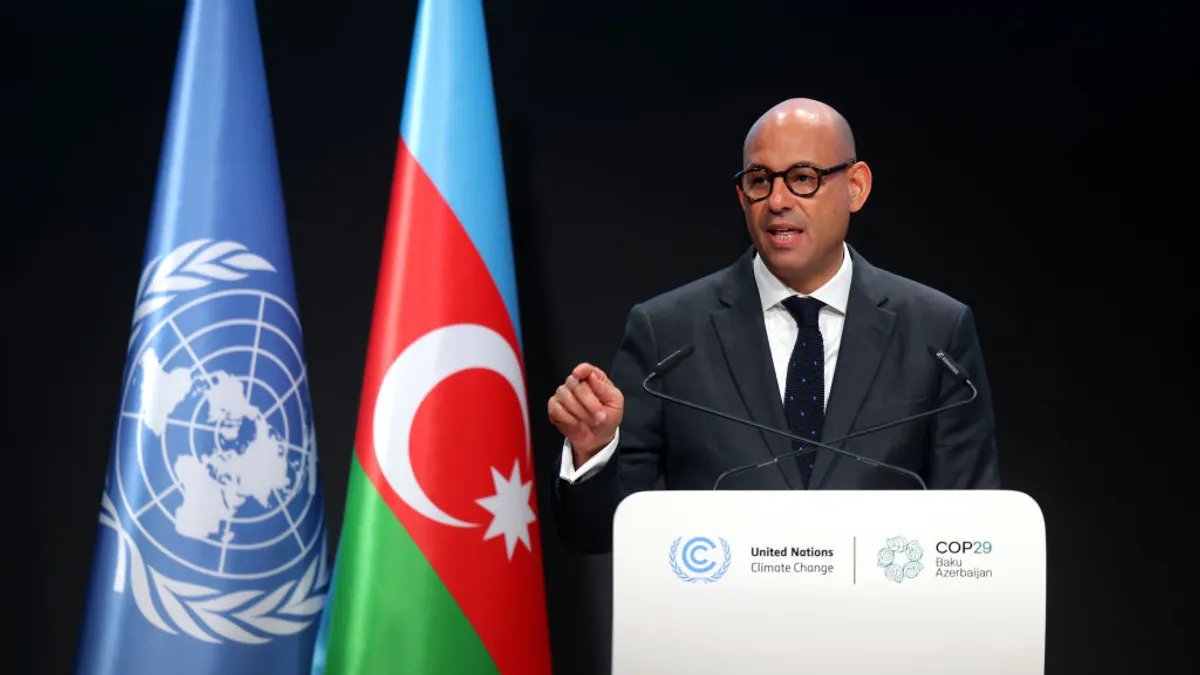Dive Brief:
- Climate negotiators secured a win on the first day of the COP29 summit in Baku, Azerbaijan, by reaching consensus on a set of standards to boost the global carbon market and enhance the integrity of carbon crediting projects.
- The standards, which fall under Article 6.4 of the Paris Agreement, were approved Monday. Yalchin Rafiyev, COP29’s lead negotiator, called the standards a “critical step” toward future climate discussions at the summit this year.
- Article 6.4 — also known as the Paris Agreement Crediting Mechanism — identifies and supports verifiable emission reduction projects, helps draw funding needed to implement them and encourages cooperation among countries and companies who are interested in utilizing such projects to reduce their carbon footprint, according to the global climate accord.
Dive Insight:
The carbon market mechanism is part of Article 6, which sets guidelines for how countries can collaborate to achieve their climate targets — a broader framework that has yet to be finalized.
The new standards aim to facilitate climate action by ramping up demand for carbon credit projects and helping direct monetary support to developing countries. The standards could potentially reduce the annual price tag attached to implementing national climate plans by nearly $250 billion, according to climate negotiators who greenlit Article 6.4.
The United Nations Climate Change Executive Secretary Simon Stiell said the Nov. 11 decision to back “strong standards for a centralized carbon market” was the culmination of over 10 years of work. Stiell said that, once operational, the market would help countries implement their climate plans in a “faster and cheaper” manner and reduce emissions. Stiell — who previously served as a senior minister in Grenada, overseeing climate resilience and the environment — said that though the approval of Article 6.4 was a “good start,” there is more work to be done.
“We are a long way from halving emissions this decade, but wins on carbon markets here at COP29 will help us get back in that race,” he said at a Tuesday press conference.
Article 6.4’s approval comes shortly after a UN-backed supervisory body — tasked with establishing and operationalizing a global carbon crediting mechanism — finalized two key standards linked to carbon removals and developing and accessing carbon crediting projects. The standards were finalized during a meeting held in Baku last month.
Rafiyev called the carbon crediting mechanism a “game-changing tool,” and one that “secured critical progress” on Article 6, which he said was one of the summit’s key priorities.
Article 6 — approved at COP26 in Glasgow, Scotland — was designed to boost international cooperation and sustainable development, as well as help unlock financial support for developing countries, per the 2021 update to the agreement.
COP29 President-designate Mukhtar Babayev said in July he was committed to finalizing the implementation of Article 6 at the summit this year, as part of his climate action themes and goals for the summit.
Climate negotiators have yet to agree on Article 6.2 of the framework. This would allow different actors, like countries and private sector companies, to exchange emission reductions and removals through bilateral agreements.
As a whole, Article 6 allows countries to transfer carbon credits produced through the reduction of greenhouse gas emissions to help other countries meet their climate goals. This transfer mechanism helps developing countries adapt to a low-carbon transition and incentivizes climate action by encouraging countries to earn carbon credits through phasing out fossil fuels or increasing renewable energy use.
The World Bank Group estimated that such a carbon credit transfer system could slash the cost of implementing countries’ enhanced emissions reductions plans — or Nationally Determined Contributions — by over half, or as much as $250 billion in 2030.















